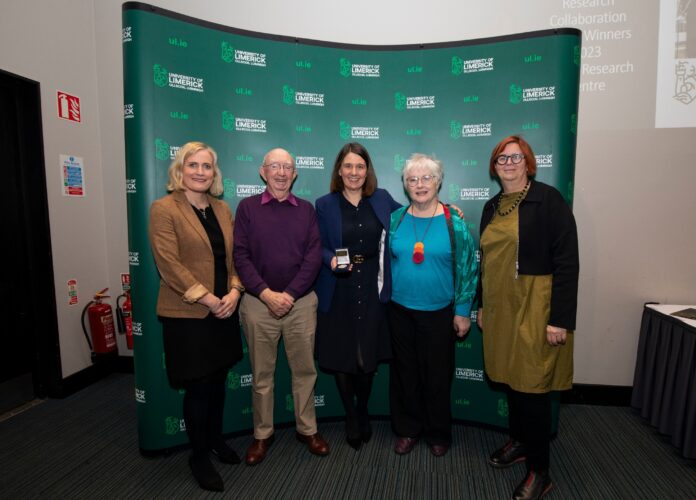
A research centre at University of Limerick, whose work has prompted changes in how older people are treated in emergency departments nationwide by significantly reducing the need for admissions, has been recognised for its work.
UL president Professor Kerstin Mey presented the Outstanding Research Collaboration Award to Professor Rose Galvin and Professor Kate Robinson, co-directors of the Ageing Research Centre (ARC), at an awards ceremony hosted on campus.
One of the studies undertaken as part of the ARC collaboration is OPTIMEND, which introduced a dedicated team of health and social care professionals (HSCPs) into an emergency department (ED) to focus on timely assessment and intervention among people aged over 65 years.
Professor Galvin explained the significance of the study, the success of which catalysed the establishment of teams on a nationwide scale, changing how older adults receive care in emergency departments.
“The OPTIMEND study was the first trial of its kind in the world. The evidence from this trial demonstrated the impact an interdisciplinary team of health and social care professionals operating within an emergency department can have on the outcomes and experiences of older adults,” Professor Galvin said.
These efforts yielded tangible improvements in outcomes of importance to older adults, research findings that have played a pivotal role in shaping national policies pertaining to health and social care for older adults.
Key findings from the study demonstrated that older adults can be safely discharged from the ED following early assessment and intervention by a health and social care protection team, in collaboration with ED medical and nursing staff.
The study also showed that older people who were assessed by the HSCP team spent significantly less time in the ED than those who did not receive HSCP care.
Professor Robinson addressed the long-term impact of the research, saying that “the OPTIMEND study developed the standard of care for older adults in EDs in Ireland and this model has been rolled out nationally. We are very proud of the impact our work has had on the lives of older adults and their caregivers.”
“We noticed that while we halved the length of ED stay and significantly reduced the incidence of admission to hospital among the group who received the HSCP intervention, the incidence of ED return within 30 days was similar in both groups. We delved into this in more detail and found that the transition from the ED to the community was fragmented.”










